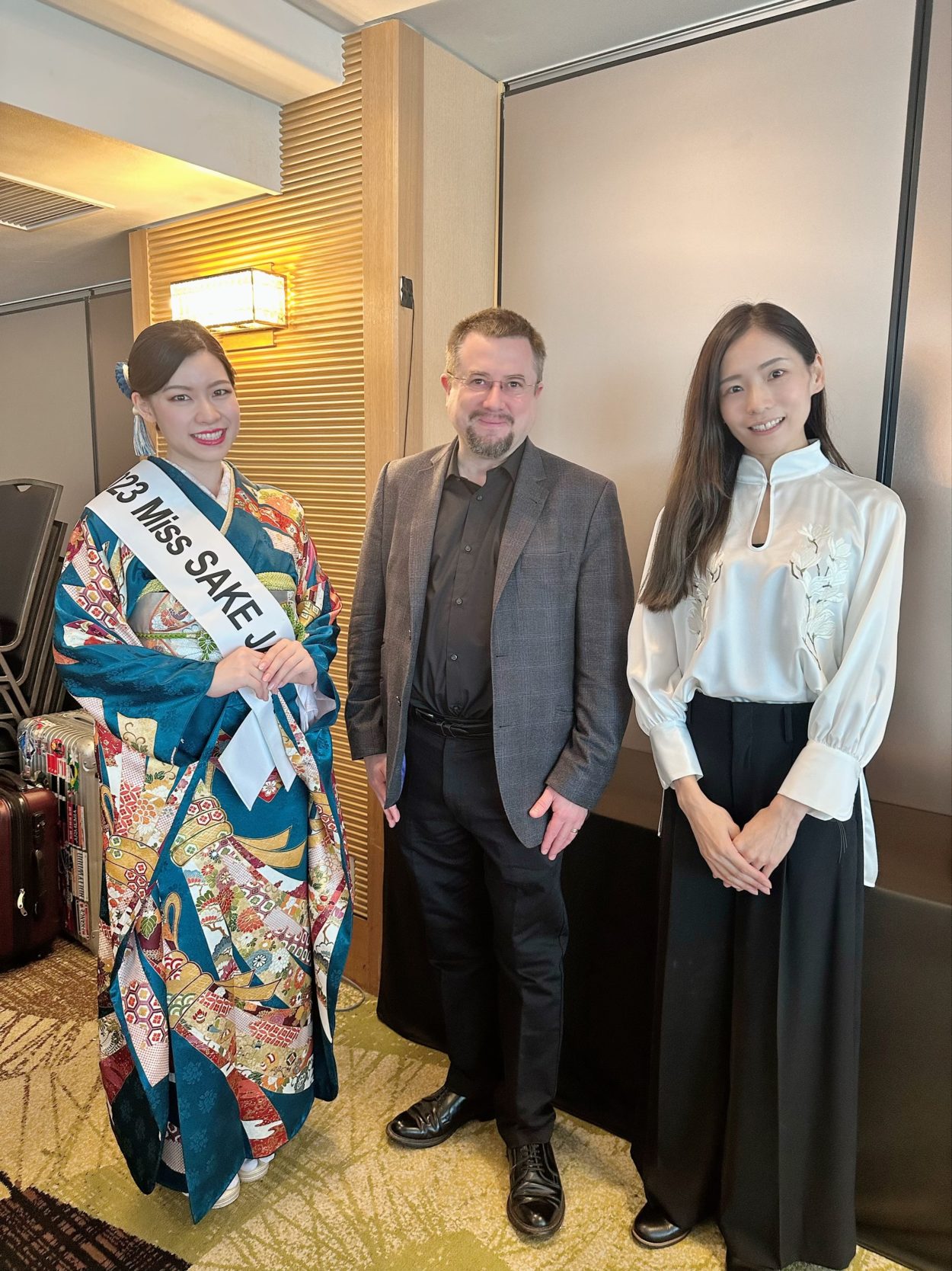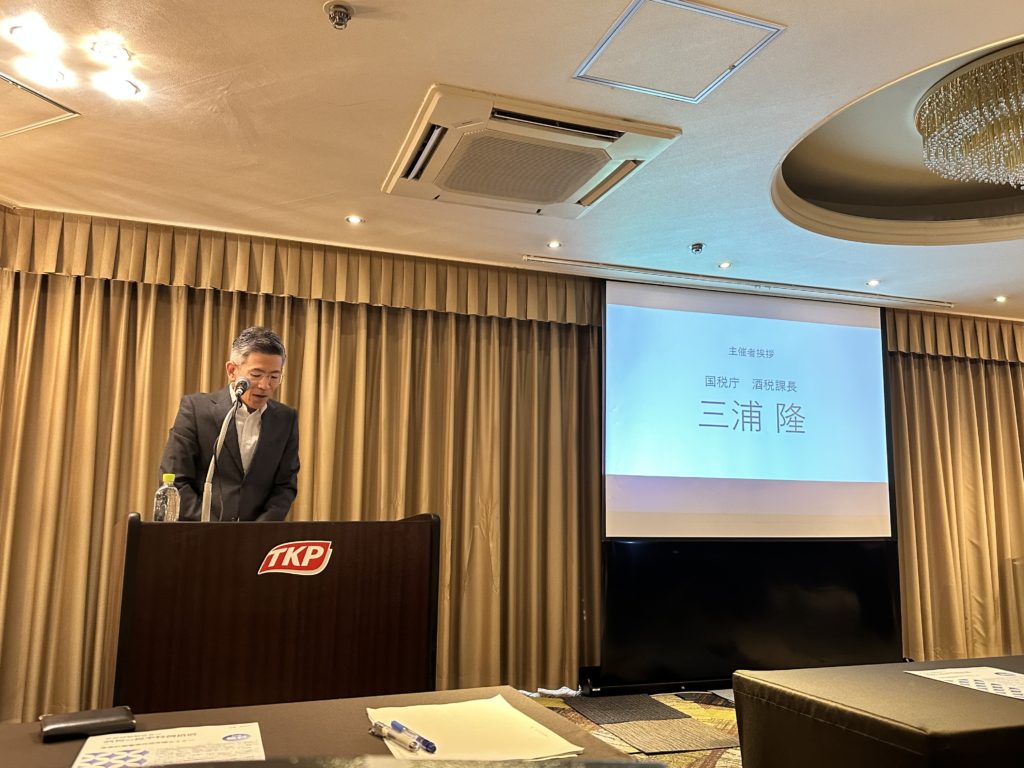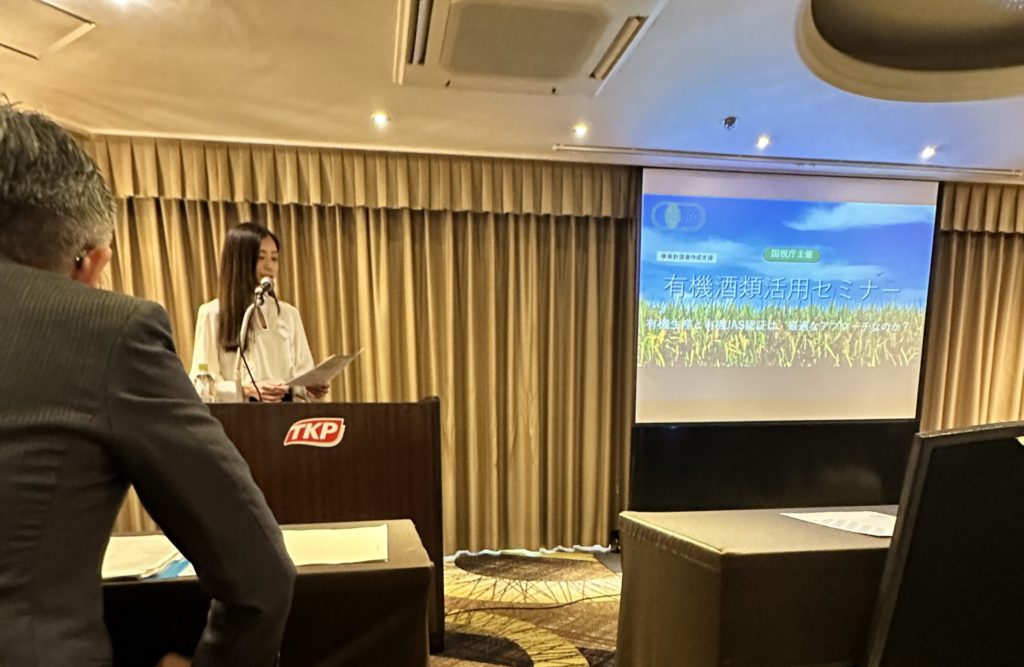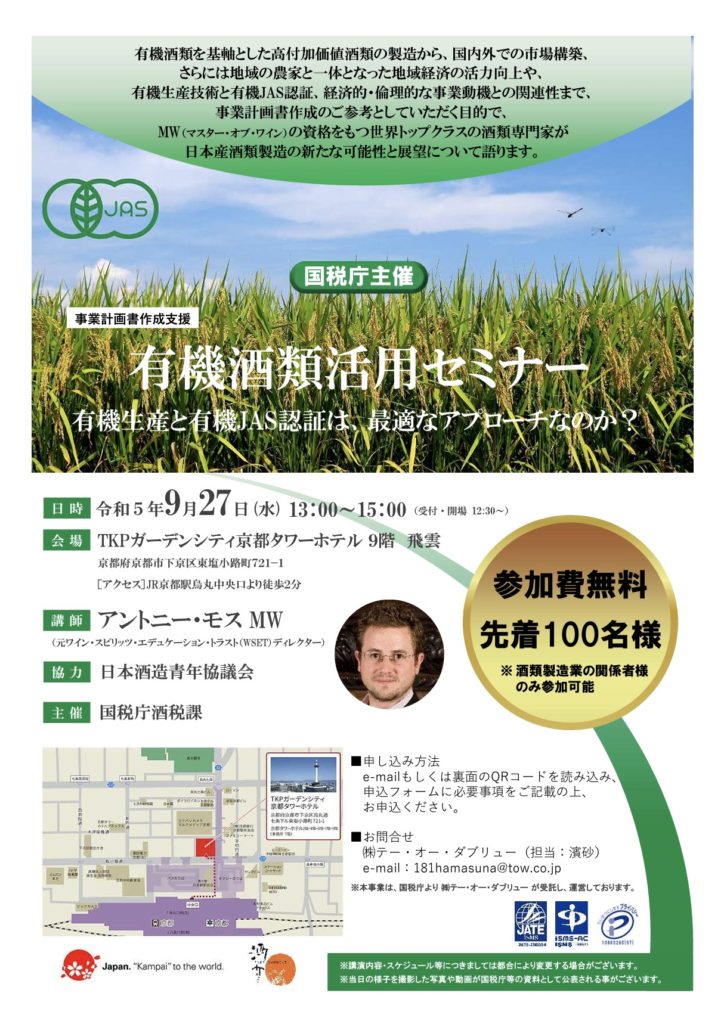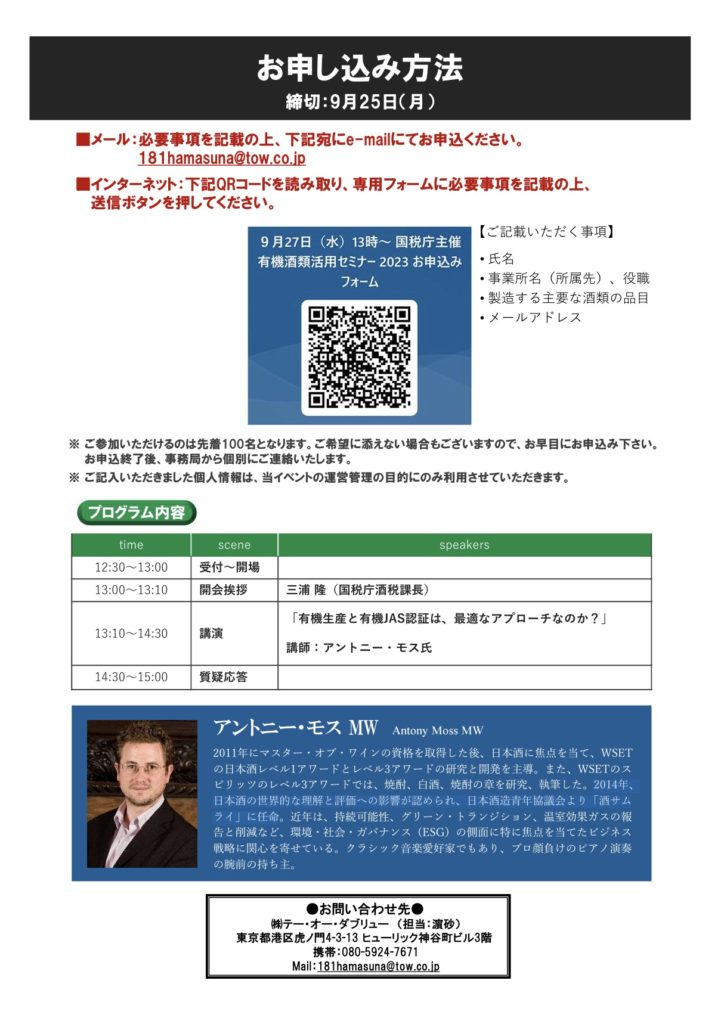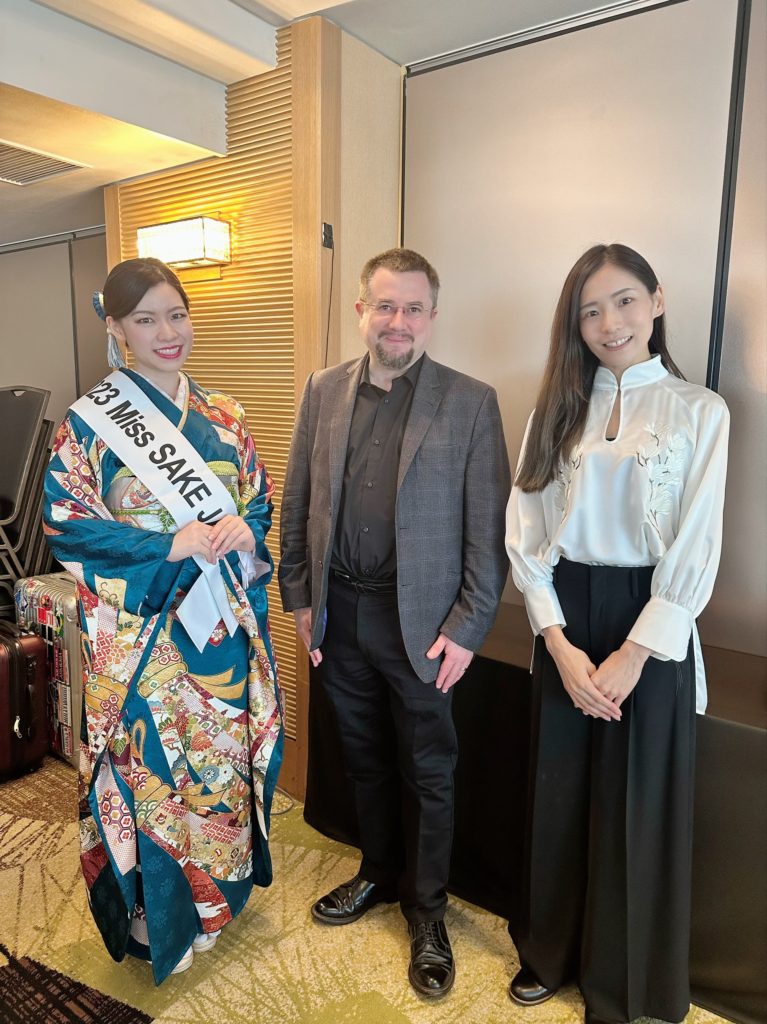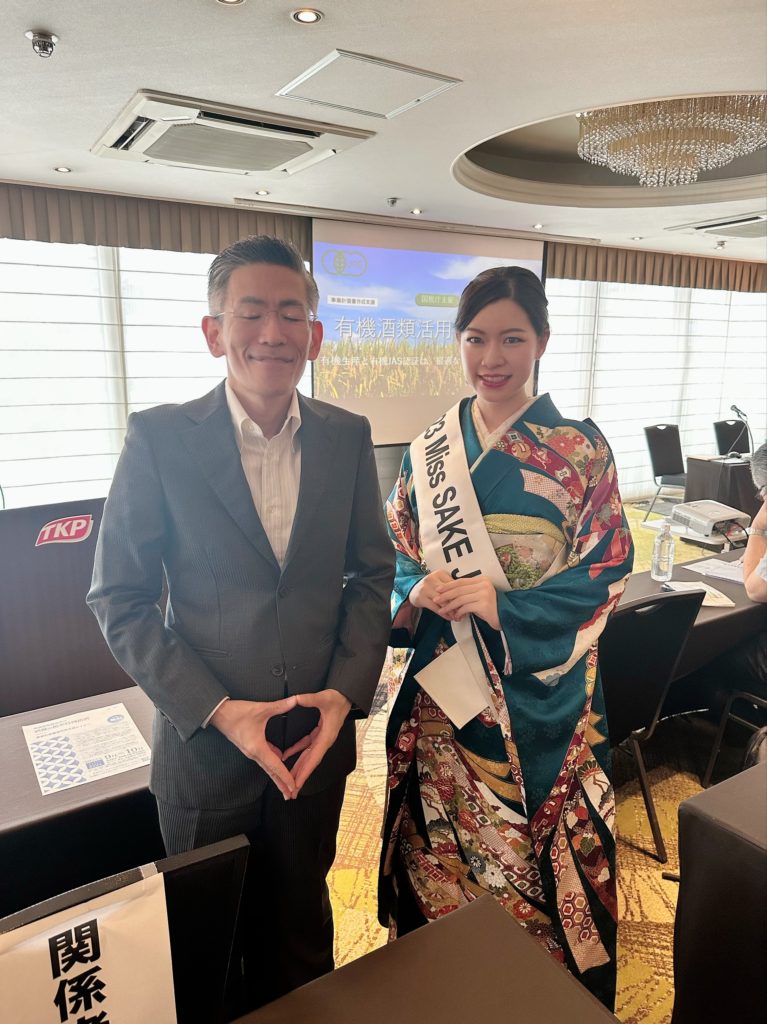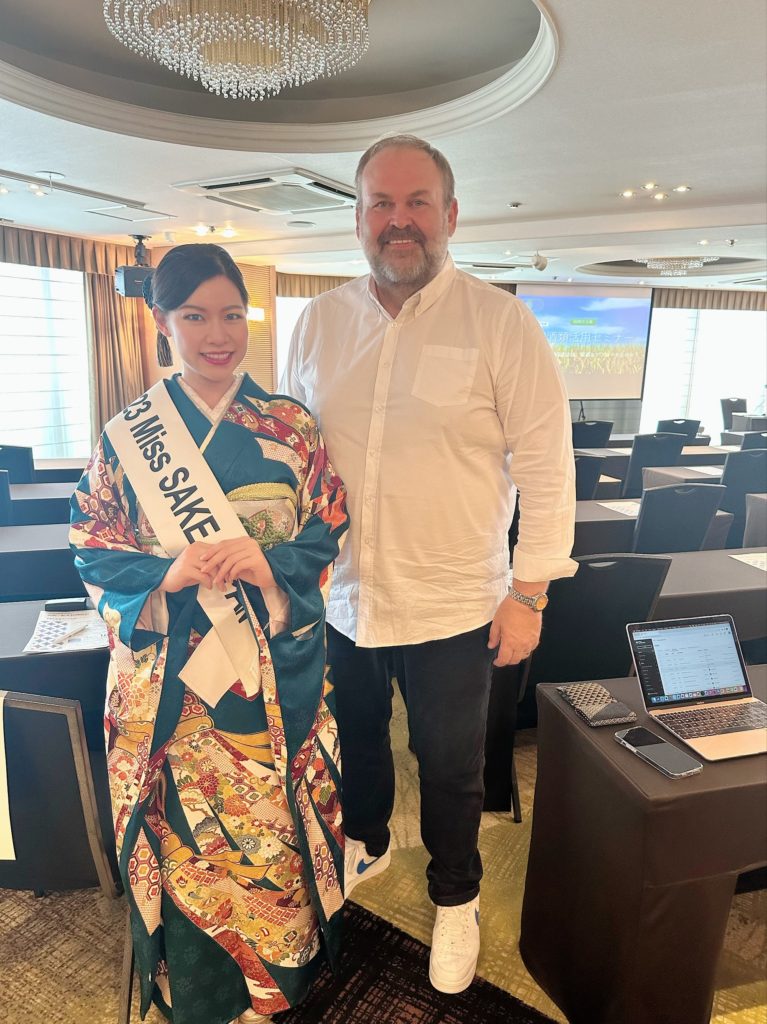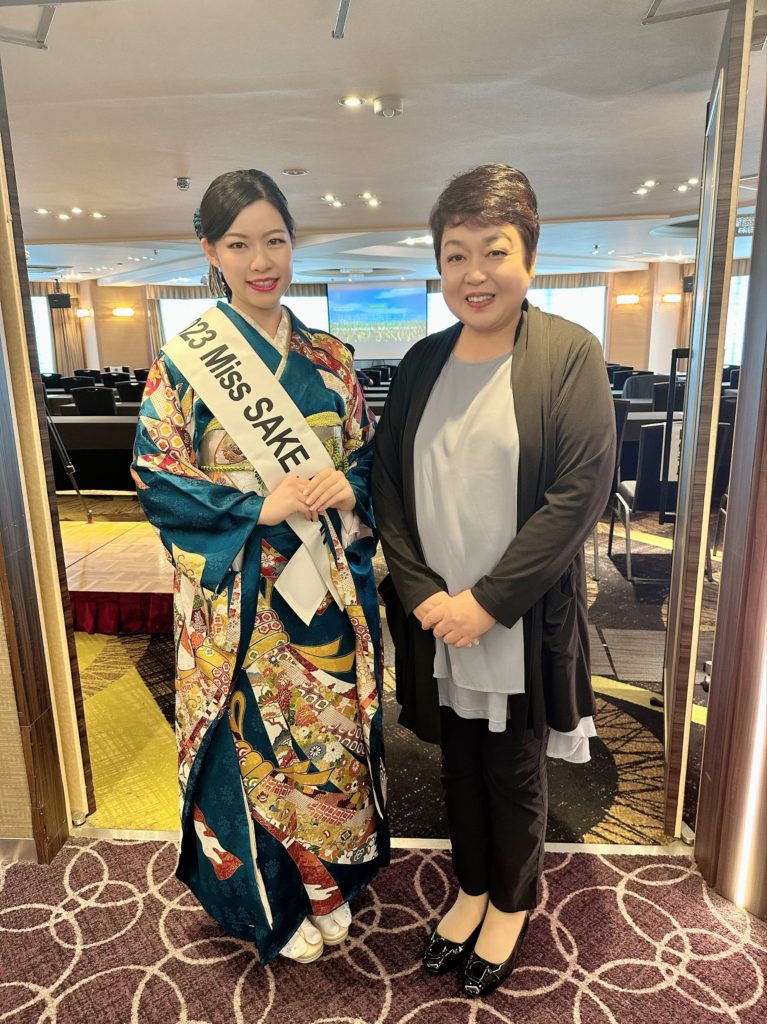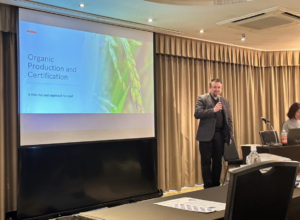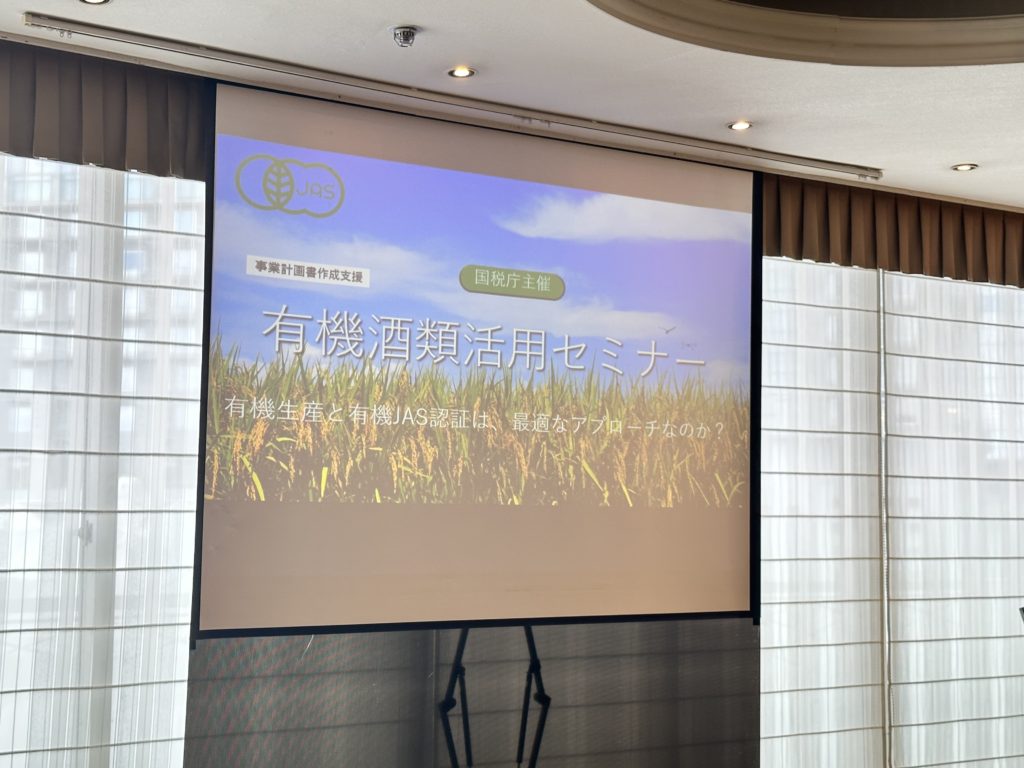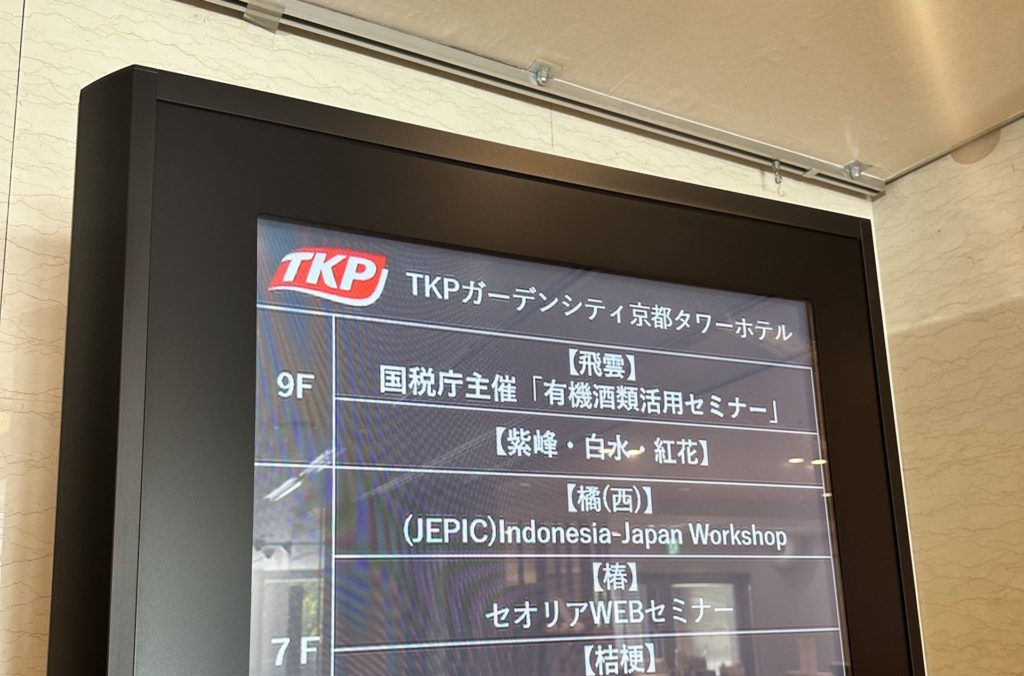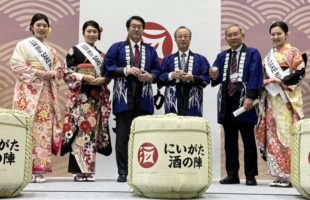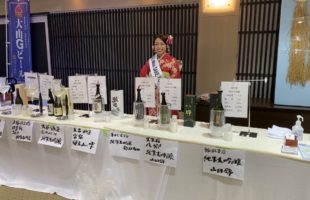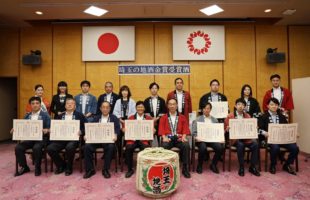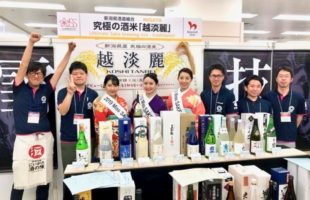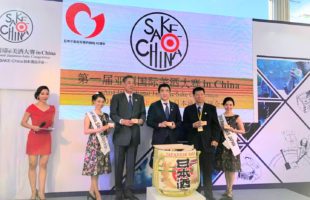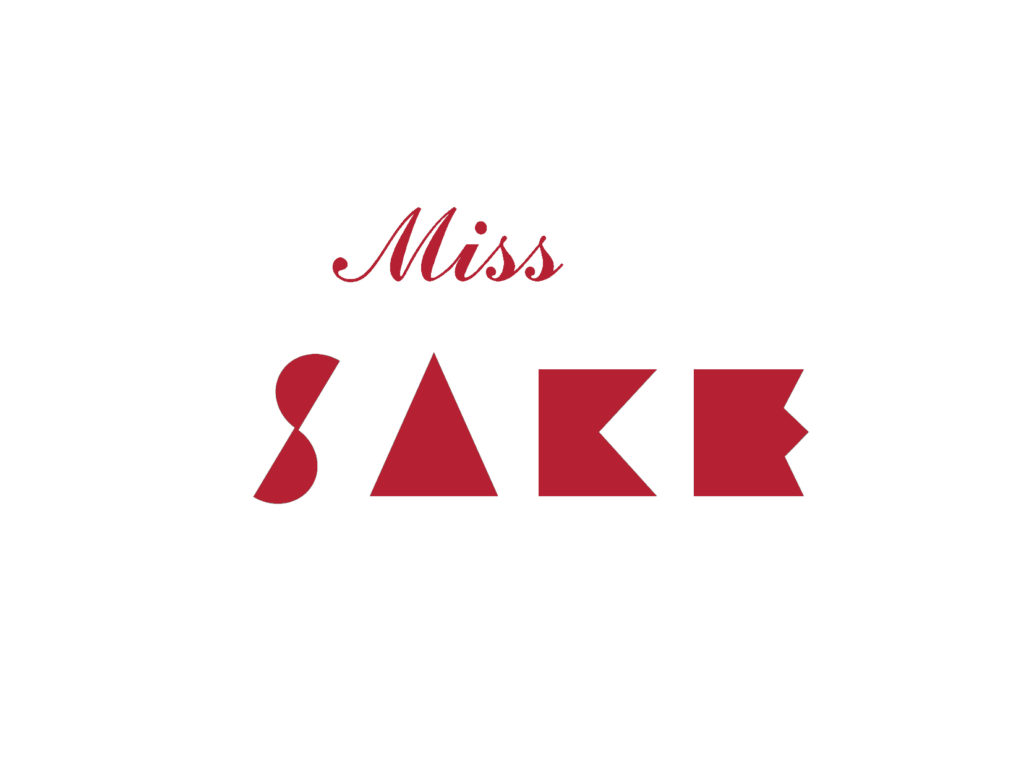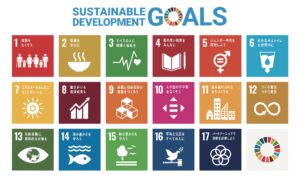2023 Miss SAKE Kotoko Yamada attended the Organic Production & Certification Seminar [English Below]
皆さま、こんにちは。
2023 Miss SAKE 山田琴子です。
酒サムライ叙任式の翌日、9月27日に京都駅前にございますTKPガーデンシティ京都タワーホテル9階 飛鳥にて国税庁酒税課様主催、日本酒造青年協議会協力の「有機酒類活用セミナー 〜有機生産と有機JAS認証は最適なアプローチなのか?〜」を受講してまいりました。
大変多くの蔵元さまや、酒販店の方、日本酒に関わる事業をなさっている方が会場に集まり、司会進行のWSET SAKEの講師を努めていらっしゃる鈴木更紗様によってセミナーは始まりました。
その後、主催の国税庁酒税課長 三浦隆様より今回のセミナー開催における目的と、コンテンツについてご説明と開会のご挨拶がありました。
この日の講師は、マスター・オブ・ワインの資格を取得した後、日本酒に焦点を当て、WSETの日本酒レベル1アワードとレベル3アワードの研究と開発を主導され、2014年には日本酒の世界的な理解と評価への影響が認められ、日本酒造⻘年協議会より「酒サムライ」に任命されたアントニー・モス様でした。また、セミナーは全てアントニー様に合わせ英語にて行われました。
セミナーのアジェンダは以下の通り:
- 導入
- 有機(オーガニック)の定義について
- なぜ有機か?
- 有機に対する消費者のセグメンテーション、モチベーション
- 有機に対する販売店のトレンド
- 有機に対する生産者の取るべき対応
- まとめ
- 質疑応答
“In comparison to organic tea, organic wine might be seen as a case study of failed new category section” – Jones & Grandjean (2018)
オーガニックのお茶と比較すると、オーガニックワインは新しいカテゴリーの創出としては失敗をしている。という2018年に手筆された有機についての本からの1行です。
この言葉は、オーガニック/有機に変更することは、必ずしも消費者の購買意欲の向上に直接的に繋がるわけではないという作者の意図が込められているそうです。
<有機(オーガニック)の定義について>
オーガニックと聞いて、皆さんは何を思い浮かべられるでしょうか?
オーガニックについて考える際、まず大切な観点は、それが生産品(Product)であるのか、加工食品(Processed goods)なのかを分けて考えることが大切です。生産品と加工食品では、有機と名乗る上での対応すべき項目が違っており、ワインや日本酒においてはまず、加工品の有機と名乗る上での必要事項の理解が重要になります。
ワインの生産の際には、SO2(亜硫酸)を酸化防止剤として添加することが多くあります。そのSO2の取り扱いについて、歴史的にヨーロッパとアメリカの使い方の定義が不明瞭かつ異なっており、このことが理由でオーガニックワインは何を持ってオーガニックワインと呼ばれるのかが不明瞭かつ品質の均一化ができず失敗であったと言われるようになってしまったそうです。
日本でも、近年まで何をもってオーガニックとするのかという定義が不明瞭であったという歴史があり、平成11年に改正されたJAS法(農林物資の規格化及び品質表示の適正化に関する法律)により、有機農産物とそれを原料とした加工食品のJAS規格が定められました。
では、オーガニックとは実際なんのことなのでしょうか?
オーガニック(有機)とは、農薬及び化学合成された肥料を使用しない農業や、農作物、加工品を指します。
我が国では、平成18年度に策定された「有機農業推進法※注1」において、有機農業を「化学的に合成された肥料及び農薬を使用しないこと並びに遺伝子組換え技術を利用しないことを基本として、農業生産に由来する環境への負荷をできる限り低減した農業生産の方法を用いて行われる農業をいう。」と定義されています。
注1 有機農業の推進に関する法律(平成18年法律第112号)
農林水産省ホームページ(https://www.maff.go.jp/j/seisan/kankyo/yuuki/)
ここで重要なのは、『オーガニック』と『サステナビリティ』(=環境への影響度合い)を混同しないで理解をすることだとアントニー様はおっしゃっておりました。
<オーガニック/有機の歴史>
オーガニックの歴史は、1900年まで遡ります。
当時の西洋社会の農家は、農作物の生産を行う中で、次第に土地が栄養を失い、細くなっていくということに懸念を持っていたそうです。この深刻な問題の解消のために、西洋の農業における研究が進められ、ベンガル、中国、日本、韓国を含む東洋の循環型の農業を参考にする動きが始まりました。
それまでは、土地は細くなってしまったら移動するしかないと思われていた中で、農業を持続可能にする輪作などの東洋の循環型の土地への考え方は、とても新しいものだったそうです。このことをきっかけに、西洋でも農業を複雑な循環型のシステムとして捉える方が増えていったようです。
<現代の消費者、生産者、小売店の状況>
消費者
近年、欧米ではアルコール消費に対する環境への悪影響を心配する声が多く上がっているとアントニー様はおっしゃっていました。
持続可能な社会(SDGs)への関心が年々と高まっている中、環境に悪いかもしれないというイメージは消費者の購買意欲に大変大きな影響を及ぼす可能性があります。このイメージを払拭のためにオーガニックのワインや日本酒は効果的であるということでした。
ですが、オーガニックワインの市場はまだまだ小さく、世界の6%のワイナリーがオーガニック認定を受けているにも関わらず、市場でのシェアは、たったの3%に満たないそうです。
オーガニックワインに対する消費者の反応は国によっても大きく違うそうです。
ヨーロッパやアメリカでは、店舗のワインのラベルに「オーガニック」の記載があると購買意欲が下がるということもわかっており、趣向品やご褒美として楽しまれるワインに対してオーガニックであるということが贅沢品ではないと捉える方もいらっしゃるようです。逆に、中国ではラベルに「オーガニック」の記載がある方がワインは売れ行きが良いということで、必ず自国にて調査を行ってから販売戦略を立てることが重要であるとのことでした。
小売店
また、小売店/販売店では、近年の関心はずっと「サステナビリティ」に重きが置かれており、温室効果ガスの削減量への関心が主となっています。オーガニックであることは、関連や相関はあるものの、必ずしもサステナブルであることとは結びつかないため、西洋の小売店では、販売商品を選定する際の優先順位としては、サステナブルの次になってしまうという現状があるそうです。
生産者
生産者に関しては、ヨーロッパとそれ以外の国で関心の度合いが変わってきます。ヨーロッパでは、オーガニックへの生産者の関心が高いのに対し、それ以外の国ではサステナビリティや温室効果ガスの排出量に生産者の注目は集まっています。
<SAKEとWINEの違い>
地上の木になり、添加するものもコントロールがしやすいワインと比較し、地面の田んぼで育てるお米を使う日本酒はオーガニックを名乗るために必要なコントロールの難易度が大きく違います。
隣接する田んぼから水が溢れてきてしまい、その水に農薬が入っているだけで無農薬とは言えなくなってしまうという難しい問題を抱えている酒米の育成は、オーガニック日本酒の出現への大きなハードルとなるだろうとアントニー様はおっしゃっておりました。
逆に、加工工程に関しては、日本酒はワインと比べて添加物が少なく、シンプルな生産工程であるため、工程の中で懸念すべきポイントはワインと比較すると少なく、オーガニックに準じた加工がしやすいのではないかということでした。
近年のSDGsへの関心の高まりによる消費者の購買意識の変化は私の身近でも起きています。
その中で、新しい日本酒の形として、『オーガニック日本酒』の可能性を考えさせていただいたこのセミナーは、いち消費者としても、今後の自分の購買行動を考えさせられる大変有意義なセミナーとなりました。
この素晴らしい学びの機会をいただきましたこと、誠に感謝いたします。
主催の国税庁酒税課様、アントニーモス様、誠にありがとうございました。
2023 Miss SAKE
山田琴子
[English Below]
Hello, everyone.
I am 2023 Miss SAKE Japan Kotoko Yamada.
On September 27th, the day after the Sake Samurai Appointment Ceremony, I had the privilege of attending the “Organic Production & Certification Seminar – Is Organic Production and Organic JAS Certification the Optimal Approach?” hosted by the National Tax Agency’s Alcohol Tax Division and organized in cooperation with the Japan Sake Brewers’ Youth Association. The seminar took place at the Asuka venue on the 9th floor of TKP Garden City Kyoto Tower Hotel, located in front of Kyoto Station.
This event brought together numerous sake brewery representatives, liquor retailers, and individuals involved in the sake industry. The seminar was moderated by Ms. Sarasa Suzuki, a WSET SAKE instructor (https://www.caplan.jp/wine/instructor/sarasa_suzuki/index.html), who has obtained the Master of Wine qualification and focused on sake-related research and development after earning her MW certification. In 2014, her significant impact on the global understanding and appreciation of sake led to her appointment as a “Sake Samurai”.
All the sessions during the seminar were conducted in English to accommodate the international audience.
Here’s an outline of the seminar agenda:
- Introduction
- Definitions of Organic
- Why Organic?
- Consumer Segmentation and Motivation for Organic
- Trends in Organic for Retailers
- Strategies for Producers in Organic
- Summary
- Q&A
The seminar began with a thought-provoking quote:
“In comparison to organic tea, organic wine might be seen as a case study of a failed new category section” – Jones & Grandjean (2018).
This quote highlighted the challenges that the organic wine industry has faced in defining itself and communicating its value to consumers.
<Definition of Organic>
Regarding the definition of organic, it’s crucial to distinguish between organic agricultural products and processed goods, as the criteria for each differ. In the context of wine and sake, understanding the requirements for labeling a product as organic is vital.
Organic agriculture and organic products involve avoiding the use of chemical pesticides and synthetic fertilizers. In Japan, the JAS (Japanese Agricultural Standards) certification for organic agricultural products and processed foods was established to provide a clear definition and framework for organics.
One key point raised during the seminar was the importance of distinguishing between “organic” and “sustainability.” While they are related, being organic doesn’t necessarily equate to being sustainable. This distinction is particularly important when considering the environmental impact of alcoholic beverage production.
<History of Organic>
The history of organics dates back to the early 1900s when Western societies began exploring sustainable agricultural practices influenced by Eastern cyclical farming systems. These practices aimed to address soil degradation concerns and introduced the concept of sustainable farming into Western agriculture.
<Current Trends>
The seminar also touched on the varying degrees of consumer, retailer, and producer interest in organics in different regions. For example, in Europe and the United States, there’s a growing concern about the environmental impact of alcohol consumption, making organic certification appealing to some consumers. However, the market share of organic wine remains relatively small, around 3%, despite 6% of wineries having organic certification.
Retailers prioritize sustainability over organics due to consumer demand, with a focus on reducing greenhouse gas emissions. Producers’ interest in organics varies by region, with European producers showing higher levels of interest compared to those in other countries.
<Differences in SAKE and WINE>
Sake, as compared to wine, faces unique challenges in achieving organic certification. The use of rice grown in flooded paddy fields makes it difficult to control external factors, such as neighboring fields potentially using pesticides. Thus, achieving organic certification for sake rice presents a significant challenge. However, the relatively simple production process of sake, with fewer additives compared to wine, may make it easier for sake to align with organic principles in processing.
In recent years, consumer awareness and interest in sustainability, as well as environmental consciousness (SDGs), have been on the rise. This shift in consumer preferences can significantly impact purchasing decisions, and organic wine and sake are seen as potential solutions to meet this demand.
The seminar served as an enlightening opportunity for me as a consumer to consider the potential of “organic sake” as a new form of Japanese sake. I appreciate having had the chance to learn from the valuable insights shared during this event.
I would like to extend my sincere gratitude to the organizers, the National Tax Agency’s Alcohol Tax Division, and Mr. Antony Moss for making this wonderful learning opportunity possible.
2023 Miss SAKE
Kotoko Yamada

